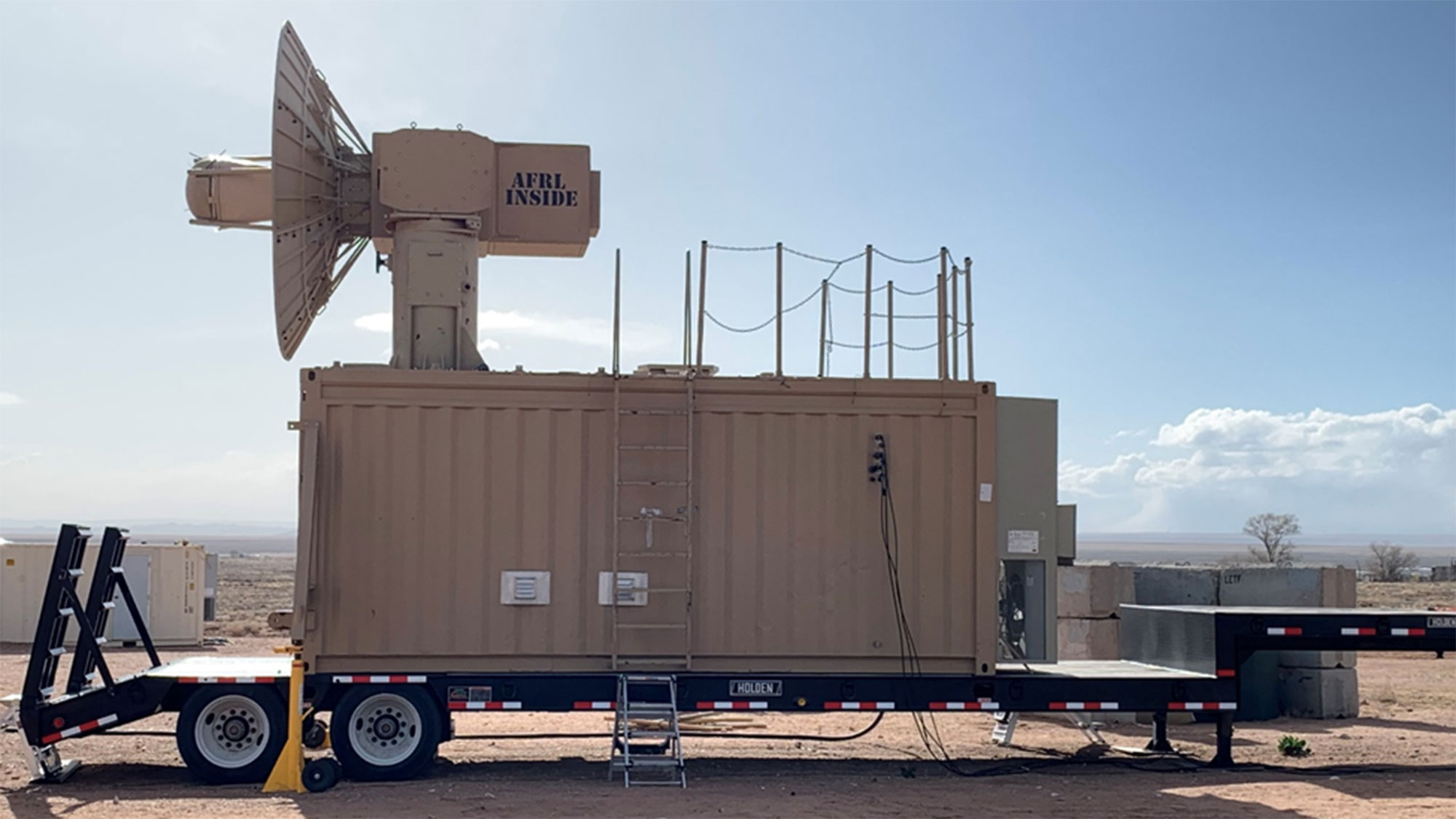

In the desert plain south of Albuquerque, New Mexico, and just north of the Isleta Pueblo reservation, the Air Force defeated a swarm of drones with THOR, a powerful microwave weapon. THOR, or the Tactical High-power Operational Responder, is designed to defend against drone swarms, frying electronics at scale in a way that could protect against many flying robots at once.
THOR has been in the works for years, with a successful demonstration in February 2021 at Kirtland Air Force Base, south of Albuquerque. From 2021 to 2022, THOR was also tested overseas.
This latest demonstration, which took place on April 5, saw the microwave face off against a swarm of multiple flying uncrewed aerial vehicles. The event took place at the Chestnut Range, short for “Conventional High Explosives & Simulation Test,” which has long been used by the Air Force Research Lab for testing.
“The THOR team flew numerous drones at the THOR system to simulate a real-world swarm attack,” said Adrian Lucero, THOR program manager at AFRL’s Directed Energy Directorate, in a release earlier this month. “THOR has never been tested against these types of drones before, but this did not stop the system from dropping the targets out of the sky with its non-kinetic, speed-of-light High-Power Microwave, or HPM pulses,” he said.
Crucial to THOR’s concept and operation is that the weapon disables and defeats drones without employing explosive or concussive power, the kind derived from rockets, missiles, bombs, and bullets. The military lumps these technologies together as “kinetics,” and they make up the bread and butter of how the military uses force. Against drones, which can cost mere hundreds or even thousands of dollars per vehicle, missiles represent an expensive form of ammunition. While the bullets used in existing counter-rocket weapons are much cheaper than missiles, they still create the problem of dangerous debris everywhere they don’t hit. Using microwaves means that only the damaged drone itself becomes a falling danger, without an added risk from the tools used to shoot it down.
“THOR was extremely efficient with a near continuous firing of the system during the swarm engagement,” Capt. Tylar Hanson, THOR deputy program manager, said in a release. “It is an early demonstrator, and we are confident we can take this same technology and make it more effective to protect our personnel around the world.”
The THOR system fits into a broader package of directed energy countermeasures being used to take on small, cheap, and effective drones. Another directed energy weapon explored for this purpose is lasers, which can burn through a drone’s hull and circuitry, but that approach takes time to hold focus on and melt a target.
“The system uses high power microwaves to cause a counter electronic effect. A target is identified, the silent weapon discharges in a nanosecond and the impact is instantaneous,” reads an Air Force fact sheet about the weapon. In a video from AFRL, THOR is described as a “low cost per shot, speed of light solution,” which uses “a focused beam of energy to defeat drones at a large target area.”
An April 2023 report from the Government Accountability Office is much more straightforward: A High Power Microwave uses “energy to affect electronics by overwhelming critical components intended to carry electrical currents such as circuit boards, power systems, or sensors. HPM systems engage targets over an area within its wider beam and can penetrate solid objects.”
Against commercial or cheaply produced drones, the kind most likely to see use on the battlefield in great numbers today, microwaves may prove to be especially effective. While THOR is still a ways from development into a fieldable weapon, the use of low-cost drones on the battlefield has expanded tremendously since the system started development. A report from RUSI, a British think tank, found that in its fight against Russia’s invasion, “Ukrainian UAV losses remain at approximately 10,000 per month.”
While that illustrates the limits of existing drone models, it also highlights the scale of drones seeing use in regular warfare. As drone technology improves, and militaries move from adapting commercial drones to dedicated military models made close to commercial cost and scale, countering those drones en masse will likely be a greater priority for militaries. In that, weapons like THOR offer an alternative to existing countermeasures, one that promises greater effects at scale.
Watch a video about THOR, which also garnered a Best of What’s New award from PopSci in 2021, from the Air Force Research Laboratory, below:

